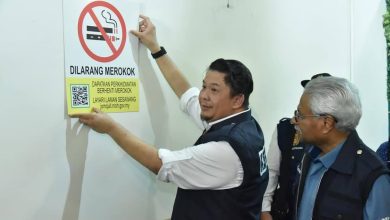Health
By SeeFoon Chan-Koppen
A disturbing trend of falling sperm counts in men and women choosing to have children later in life owing to career considerations has resulted in rising infertility in couples. This was revealed by Fatimah Hospital’s new consultant Urogynaecologist and infertility expert, Dr Lai Poon Seet when interviewed by Ipoh Echo recently.
He looks a youthful 30-something and yet on chatting with Dr Lai and hearing him explain that he completed his residency and housemanship in various hospitals in the UK and Dublin where he received his first medical degree, spent 5 years as a Senior lecturer and clinical specialist at HUKM, and finally 15 years in private practice in Kepong, recently two years in Australia updating himself on Urogynaecology, with quick mental arithmetic, I realised that his looks belie his age and that this was a mature and seasoned specialist sitting in front of me. And he speaks with experience and authority.
“Studies have shown that sperm counts in men have fallen by 50 per cent every 5-10 years owing to environmental factors. Known environmental pollution such as BPA or Bisphenol-A, a chemical building block that is used primarily to make polycarbonate plastic and epoxy resins commonly found in reusable food and drink containers and many other products; and the other is pesticides in food.” he said.
“Adding to the problem is that the older the eggs are in a woman, the lesser the chances of conceiving. In Vitro Fertilisation (IVF) has very poor results past the age of age 36 and most IVF centres have very poor take home baby rates after the age of 40. Hence I always make the case for women to start having families as early as possible, preferably straight after marriage” he stressed emphatically.
Dr Lai naturally performs the usual Ob/Gyn procedures of deliveries, prenatal and antenatal care. However it is in talking about his main specialty of Urogynaecology, that he becomes animated. This is a subspecialty offering women with problems of stress incontinence and uterovaginal prolapse with minimally invasive surgery through the vaginal route. Stress incontinence is leakage of urine with cough, exercise or even walking as opposed to other forms of urinary incontinence, which are not helped by surgery.
“In women, the urethra is shorter and the sphincter gets weakened by childbirth and the aging process, often leading to incontinence or a weak bladder. I believe in first prescribing non-surgical solutions and will usually recommend Kegel exercises for strengthening the pelvic floor. However, women need to understand that progress can only be seen after doing the exercises diligently for six months and will continue to improve over time.”
“Women stress incontinence, can now be treated with minimally invasive procedure called the Transvaginal Transobturator Sling (TVT-O). Women with associated prolapsed uterus, bladder, rectal or small bowel prolapse can undergo vaginal hysterectomy and pelvic floor repair which can be performed under Regional Anesthesia and very suitable for the elderly. Urogynecological surgeries are now minimally invasive surgery done through a vaginal approach. With the option of Regional Anesthesia, the usual risks associated with General Anesthesia is reduced therefore recovery time is much shorter with less pain and reduced complications associated with abdominal surgery.”
Why did he pick OBGYN as a field of study? “The reward of bringing life into the world is ineffable. Also growing up in a family of women with my mother and sisters, have inculcated in me a love and understanding of women and to hear a warm ‘thank you’ after a successful procedure is music to my ears.”
With those words echoing in my ears as I left Dr Lai’s clinic, I know that should I ever need an Urogynaecologist, he’s my man.


